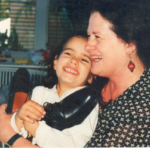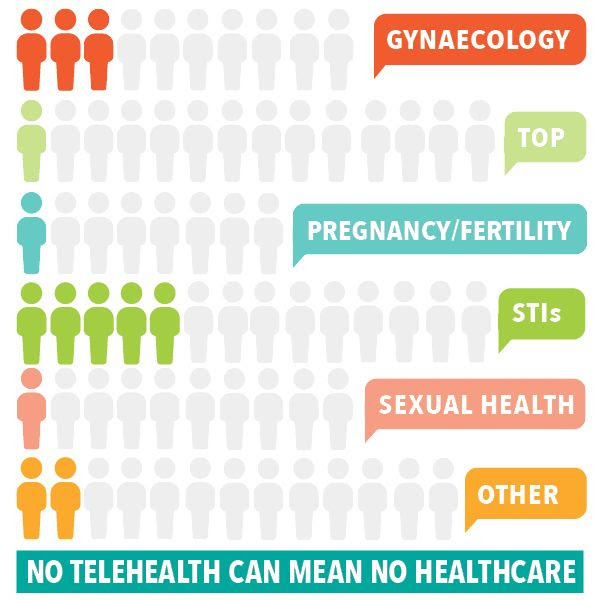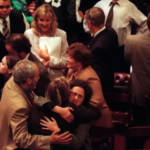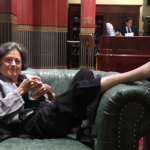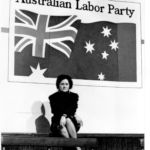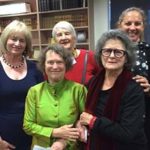Women in Prisons Chapter
This is very much a work in progress. There is more editing to do and the in-text notes will eventually be transformed into endnotes.
This text is the first half of what will be a very long chapter reflecting Ann Symonds’ long commitment to prison reform). It may seem perverse to post something unfinished. But online publishing allows authors to ask for feedback and assistance. I drafted most of this account of Ann’s work in isolation. First there were three lockdowns and now my access to sources has been curtailed by my role as a carer. I have Ann’s papers and her taped interviews but I need to talk to other people, both supporters and critics of her approach. I would welcome suggestions about contacts and alternative sources, as well as criticism of the text so far. I am quite prepared to be told where and how I have got things wrong.
Hilary Golder
- Published in News, Uncategorized
The Latest Chapter – The Making of a Not-so-Accidental Politician – Ann Symonds
We have uploaded the latest chapter in the history of Ann’s political career: The Making of a Not-so-Accidental Politician. Based on interviews, documents and Ann’s extensive archive, Hilary Golder explores Ann’s path into the New South Wales Parliament. A key issue was affordable child care, the 1970s campaign which lifted Ann’s profile in the Labor Party. It makes fascinating reading given the current debates about child care.
Dr Golder has embarked on the next chapter about Ann’s campaigns for women prisoners and the children of prisoners. Ann continued to fight for the rights of women and children within the criminal justice system throughout her career as a member of the Legislative Council and after her retirement, right up until her death in 2018. It was a cause about which she was particularly passionate.
POSC’s work on Ann’s career in politics involves not only Dr Golder’s research and writing, but also a major undertaking to manage Ann’s archives. Dr Golder and archivist Gabrielle Hyslop have been sorting the 97 boxes of papers from Ann’s office in the NSW Parliament. A selection of her records were kept in the Parliamentary Archives but the material in the 97 boxes was not required for that collection. Once the documents have undergone archival appraisal, arrangement and description, they will form an invaluable resource for future researchers.
We welcome your feedback about our website and the chapters recounting Ann’s political life. If you would like to contribute to Ann’s story, please contact us by email: info@politicsofsocialchange.org.au.
Thank you for your support!
- Published in Uncategorized
Fair Agenda – Achievements in 2020
The Politics of Social Change can be seen in action through the work of Fair Agenda. Fair Agenda is a community of 37,000 Australians campaigning for a fair and equal future for women and here is their report on their achievements in 2020.
“2020 has been a uniquely hard and exhausting year. As we approach the end of it, most of us are ready to put it in our rear view mirror and never look back. But before we do, it’s important that we take a moment to acknowledge what we achieved together this year – because even though 2020 has challenged many of us like never before, our community continued to pull together to advocate for the values we hold dear. And together, we secured crucial wins for a more fair and equal future.
Despite it all, we still managed to focus a spotlight on policies hurting our communities and to build momentum for solutions. Together we sent thousands of emails to decision-makers; shared personal testimonies; amplified the experiences of people impacted by harmful systems; secured media headlines to hold decision-makers accountable in key moments; shared crucial analysis; and engaged community members across the country with our calls for action. And the results of our collective efforts speak for themselves!
• Alongside partners like Equality Australia and Democracy in Colour, our community drew attention to the expected harmful impacts of the proposed Religious Discrimination Bill. We raised awareness of, and mobilised to push back against, its potential to increase obstructions to reproductive healthcare access and to open avenues for discrimination. And together with our partners, we managed to drum up enough concern amongst the community and politicians that the first and second versions of the Religious Discrimination Bill didn’t go ahead.
• When it was revealed that the Morrison Government weren’t planning to continue funding for the WESNET Safe Phones program – which provides hundreds of women affected by family violence with safe technology each month – we worked with service providers and survivor advocates to oppose the cuts. Together, we kept the issue on the agenda: shining a spotlight on these cuts and other areas where the Morrison Government needs to act to keep women safe; flooding government representatives with emails about funding of services; reaching tens of thousands of people with the campaign’s message on social media; and calling the Government out when their commitments fell short of what’s needed. And together with campaign partners we secured an extension for the program’s funding – keeping safe phones in the hands of victim-survivors at critical times.
• When the pandemic hit, our community continued to build on years of advocacy for proper funding of family violence services by collaborating with family violence experts to support their calls for a response to the family violence impacts of the pandemic. In response to the collective efforts of survivor advocates, services, policy experts and communities like ours the Morrison Government committed an additional $150 million “to support Australians experiencing domestic, family or sexual violence due to fallout from coronavirus”.
• Finally, after over a year of campaigning, emailing, calling, and sharing testimonies to show support for patient protections (and a final surge to fight off a damaging amendment) we saw the passage of safe zone protections in South Australia – to ensure patients and staff don’t have to endure harassment and intimidation at clinics providing abortion care.
And our campaigning efforts didn’t stop there! We also worked to lay the groundwork and built momentum for improved access to reproductive healthcare in SA and WA. These states are both expected to face final votes to decriminalise abortion care and create safe access zones respectively, in 2021. And we’re going to need to hit the ground running to ensure that anti-choice forces don’t pressure politicians to delay, block or water down these crucial reforms.
In the new year we’re also going to continue building on our community’s ongoing campaigns to improve prevention and responses to gendered violence, and ensure everyone has access to the support they need to build safer futures. We know that there has been an increase in gendered violence and it’s going to be more important than ever that we’re holding governments accountable for fully funding family violence services, and supporting victim-survivors to be safe.
Our movement’s impact is made possible by people like you chipping in what they can, when they can, to win change on the issues that matter to all of us. Can you chip in to help make sure our community has the resources it needs to hit the ground running in 2021? Click here to make a donation now.
Fair Agenda is a movement made strong by tens of thousands of people contributing to our impact in the ways they can, when they can. We know that 2020 has been a challenging year for many in our community, so if you’re not able to contribute financially at this time, we totally understand. Giving financially is just one of the many ways that members make our movement and campaigns strong.
Thank you for all the ways you’re contributing to a fairer and more just future, we look forward to working with you to drive more impact in 2021.
Stacey and Renee for Fair Agenda”
For more information go to Fair Agenda
POSC Listening – Podcasts
A podcast for anyone wanting to know why the US Supreme Court is now the most important item on Trump’s agenda
So much happening – so many questions – where to start reading – who knows what’s’ happening. Amongst a plethora of information sources here are a few podcasts worth a listen:
Women Rule – Politico
The goal of the Women Rule podcast is to dig deep and share the keys to success with the Women Rule audience and the journey to get there.
The lie that binds – NARAL
A podcast for anyone wanting to know why the US Supreme Court is now the most important item on Trump’s agenda. From NARAL Pro-Choice America: The Lie that Binds, a 6-part podcast series that unpacks the terrifying rise of the anti-choice movement from its surprising roots in school segregation to the election of President Donald Trump. Includes reproductive rights, US elections.
by Sally Trevena
.
POSC Musings
This week brings us two great readings from Julia Gillard and Melinda Gates. Gillard has been at the forefront of the discussion about women and leadership and Gates similarly on the role of gender equality.
Julia Gillard’s new book, Women and Leadership: Real Lives, Real Lessons was co-authored with former Nigerian Finance Minister and former Managing Director of Operations for the World Bank Dr Ngozi Okonjo-Iweala, and shares the experiences of some of the world’s most high profile female leaders. From their broad experience on the world stage in politics, economics and global not-for-profits, Ngozi Okonjo-Iweala and Julia Gillard have some strong ideas about the impact of gender on the treatment of leaders. Featuring Jacinda Ardern, Hillary Clinton, Ellen Johnson Sirleaf, Theresa May, Michelle Bachelet, Joyce Banda, Erna Solberg, Christine Lagarde and more.
Women and Leadership: Real Lives, Real Lessons by Julia Gillard and Dr Ngozi Okonjo-Iweala
Melinda Gates sets out a path to how gender equality must be at the core of the world’s response to Covid-19, in recovery and rebuild in a comprehensive policy paper published this week in Foreign Affairs. Read the full article here: The Pandemic’s Toll on Women – COVID-19 Is Gender-Blind, But Not Gender-Neutral
“Every day brings new examples of the ways in which women are being left behind by the world’s response to the pandemic. There are women in labor being turned away from overburdened hospitals; domestic workers whose lost income won’t be replaced by stimulus funding; adolescent girls who cannot continue their education online because their communities frown at the sight of a phone in the hands of a woman.
“Gender-blind is not gender-neutral” is a refrain among advocates for women and girls. In this crucial moment, it must also be a call to action. If policymakers ignore the ways that the disease and its impacts are affecting men and women differently, they risk prolonging the crisis and slowing economic recovery. But if they use this emergency as an opportunity to replace old systems with new and better ones, countries can build back more prosperous, more prepared, and more equal.”
The Pandemic’s Toll on Women – COVID-19 Is Gender-Blind, But Not Gender-Neutral by Melinda Gates
- Published in Readings
We say a final sad farewell to a key Miranda Project supporter
Vale Ann Symonds AM
Originally published by Miranda Matters – Issue 11, May 2019
On 15 November 2018 Ann Symonds AM died in Sydney after a long illness. She had been instrumental in the establishment of the Miranda Project, providing initial funding for a scoping study. During and following her seventeen years as a member of the NSW Legislative Council, Ann had been a tireless and unflinching advocate for women and children, drug law reform, gun control and peace. She was the much-loved patron of SHINE for Kids and the Corrective Services NSW Mothers and Children’s (residential) Program. Her warmth, humour, energy and intelligence endeared her to the many people she worked with to achieve positive change.
Ann was chair of the Corrective Services NSW Women’s Advisory Council when she heard, through the then Principal Advisor for Women Deirdre Hyslop, now Program Director of the Miranda Project, about UK Women’s Centres that supported women to address their needs. For women in the criminal justice system, the centres had shown success in keeping women in the community, serving community-based sentences rather than jail terms. One of the key areas of activism for Ann was keeping women with their children, and that included keeping them out of prison. Through unfailing encouragement and some funding, she paved the way for the Miranda Project to come to fruition.
The Politics of Social Change Foundation has been set up by a group of women committed to redressing women’s inequality and disadvantage. To inspire others to become agents of progressive change we are writing the Ann’s story.
Read the introductory chapter of her tale at here
Researcher/author, Dr Hilary Golder, is currently reading reports and Ann’s parliamentary papers relevant to women in prison in preparation for the prisons chapter. Contact is welcomed from anyone who had contact with Ann in relation to her activism in this area. Information as well as donations are very warmly welcomed.
The Politics of Social Change Foundation has been accepted by the National Foundation of Australian Women (NFAW) as a preferred donor fund, meaning tax deductible donations can be made through a secure link on the NFAW website: www.nfaw.org/donate/ Highlight Politics of Social Change Foundation on the drop-down menu for donations. A tax-deductible receipt will be generated automatically.
- Published in Uncategorized
Remembering Ann Symonds
From the NSW Legislative Council
“On 15 November 2018 the President announced the death of Mrs Elizabeth Symonds AM, aged 79 years, a member of this House from 1982 to 1998. On 22 November 2018 the Honorable Penny Sharpe MLC moved a tribute motion and the Hansard transcript is available at this link. “
You can watch the tributes to Ann commencing with Penny Sharpe -Part 1 here and Part 2 here
Speakers include:
The Hon. Penny Sharpe
The Hon. Don Harwin
The Hon. Adam Searle
Mr Justin Field
The Hon. John Graham
Reverend the Hon. Fred Nile
Mr David Shoebridge
The Hon. Peter Primrose
The Hon. Shayne Mallard
The Hon. Catherine Cusack
- Published in News
Campaigner achieved victory over safe injecting rooms trials
Ann Symonds saved lives and changed lives.
Tony Stephens, Meredith Symonds
She saved them by fighting, losing, then fighting again to provide safe injecting rooms for drug users at Kings Cross. She changed lives by her efforts to create homes for women escaping domestic violence or the curse of drugs, by finding legal ways to keep women out of jail and to care for the children of incarcerated women.
Her many campaigns lasted 50 years, until her death. Some, such as those for gun law reform, drug law reform, improved child care services, affordable housing and same-sex marriage, were unfashionable when she embraced them.
She was rusted-on Labor Left. “I’m the last member of the Emotional Left,” she had said. “And it was a small faction to begin with.” Principled, determined, even dogged and sometimes provocative, she nonetheless understood the central place of compromise in the political system. She convened the 100-member, cross-party, state and commonwealth Australian Parliamentary Group on Drug Law Reform.
SMH – 8 December 2018
Ann Symonds saved lives and changed lives.
- Published in News
Ann Symonds publication
Introduction: A Tale of Two Speeches
Hilary Golder*
The first publication commissioned by the Politics of Social Change Foundation focuses on the career of a woman who liked to describe herself as an ‘accidental politician.’
The late Ann Symonds was ‘catapulted’ into the New South Wales Legislative Council in September 1982. Having narrowly missed election to the Council in 1981, she was chosen by the Australian Labor Party to fill the casual vacancy caused when Peter Baldwin, a fellow member of the Labor Left, resigned to run for a federal seat. She was elected in her own right in 1984 and 1995, but retired in April 1998.
Ann was a left-winger in a party dominated by a winner-takes-all Right faction and a feminist joining a parliament where women were barely visible. Her arrival in 1982 brought the number of women in the then 44-member Legislative Council up to a resounding eight. This was better than the Legislative Assembly where two women were swamped by 97 men.
Even so the Council, which was in the final stages of transition from an appointed to an elected body, still had a reputation as something of a gentleman’s club. As a ‘socialist feminist’, who was active in the peace movement, Ann brought with her ideas and causes rarely discussed in the Council and not particularly congenial to the power brokers in her own party.
How did Ann address the double disadvantage of her faction and gender? The words ‘head on’ seem appropriate. The best introduction to her politics – and to the themes of this book – can be found in the first and last speeches she made in the Council. Ann Symonds – Introduction – Draft
Please note this is a draft with end notes to be added
*Hilary Golder is a Board member of the Politics of Social Change Foundation and has written extensively about Australian public history. Hilary has a PhD, School of History, University of New South Wales and BA (Hons) in Modern History, Somerville College, Oxford University.
You can read more about Hilary here and here Hilary Golder CV.
- Published in News
- 1
- 2
